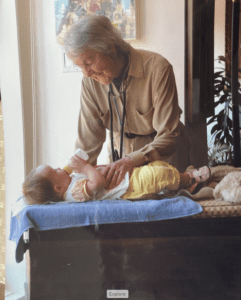Remembering The Woman Who Cared: Dr. Audrey Evans
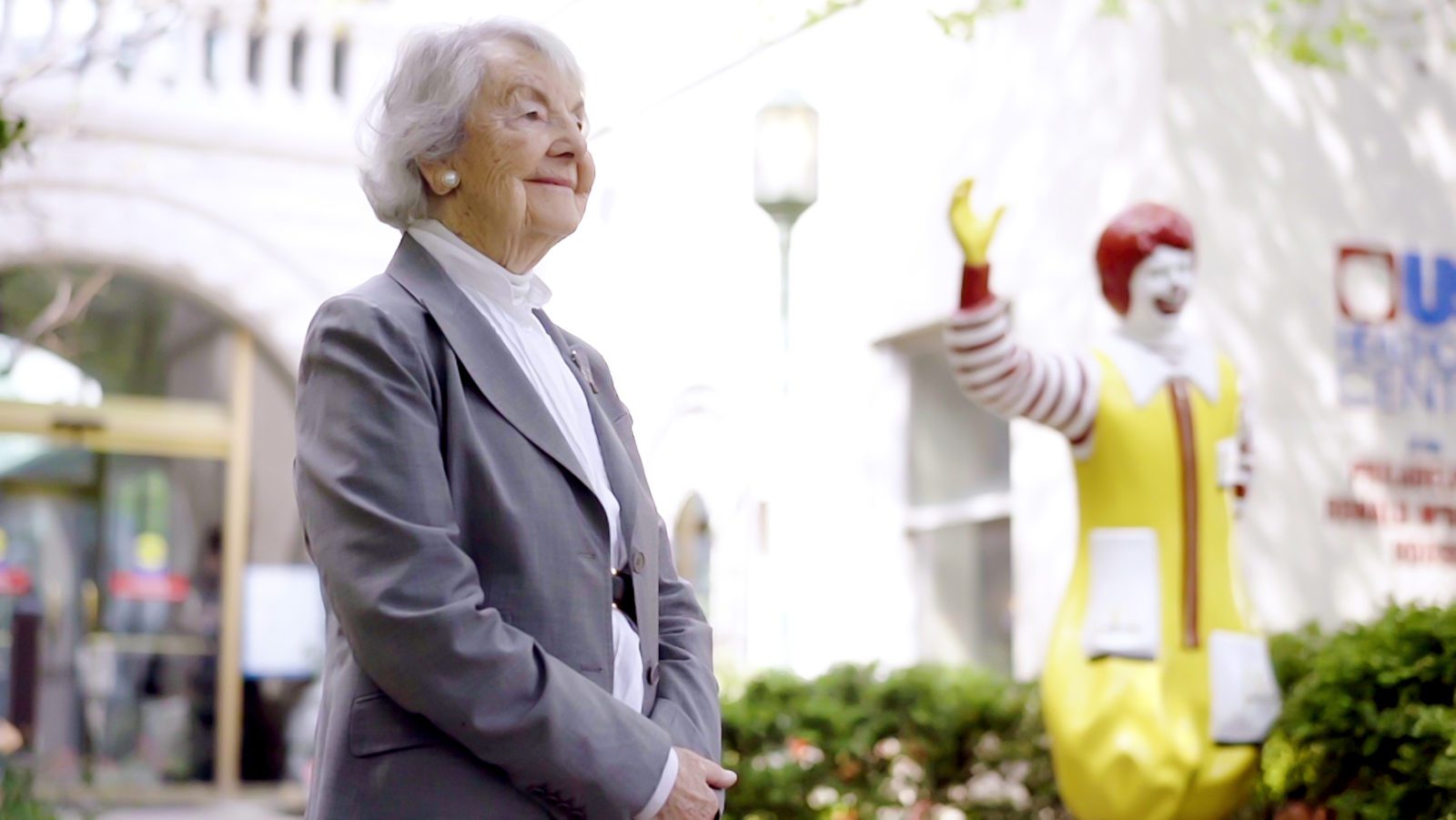
Born in York, England on March 6, 1925, Audrey Evans knew from the time she was 5 years old that she wanted to be a doctor. She even kept a small medical kit with her in case any animals needed healing. In an era when such thinking was hardly universal, Audrey was blessed with parents who believed as she has said, “girls should do as well as boys.”
During World War II, Audrey took advantage of the shortage of male medical students and enrolled in the Royal College of Surgeons of Edinburgh (Scotland) where she struggled with her courses. As she shares, “I never excelled in school because I had a memory problem. Most students learn by reading, but I remember things from what I hear. I had trouble in medical school. I failed my first year in anatomy.” Eventually, her lessons were explained verbally and via pictures. “I scrambled through medical school till I got to the clinical part,” she admits. “Then I could talk to the medical staff and the families. I was a good connector.”
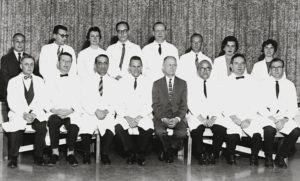
Dr. Evans and her peers in the 1950s. Credit: RMHC Philadelphia
After graduating from the Royal College of Surgeons in 1953, Dr. Evans spent the first two years of her residency on a Fulbright Fellowship at the Boston Children’s Hospital, training under Dr. Sidney Farber, a renowned pathologist, pioneer in the study of leukemia and the father of modern chemotherapy. It was Dr. Farber who introduced her to the “total care approach” of tending to the entire family, not just the sick child. This philosophy became the driving force behind the rest of Dr. Evans long career.
From Massachusetts, she spent a year at Johns Hopkins before finishing her residency at the Royal Infirmary Teaching Hospital in Edinburgh, where, for a time, she was the only female among over a dozen residents. Rather than finding her situation difficult, she remembers it as amusing. “I was having fun,” she recalls. At the time, only about 6% of American doctors were female, so she felt she was lucky. “I knew where I was going. I had a plan.”
After returning to Boston Children’s Hospital, Dr. Evans found her true calling, caring for children with cancer. In 1969, following a stint at the University of Chicago, she was recruited by the future Surgeon General of the United States, C. Everett Koop, to be the first Chief of Pediatric Oncology (the diagnosis and treatment of cancer) at the Children’s Hospital of Philadelphia. Dr. Evans would spend the next four decades at the hospital, where she would eventually found the Children’s Cancer Center.
A vision for her life’s work became clear in church one Sunday. “God was calling for a woman who cared, and I thought, wow, that’s who called me. I knew at that sermon that was why I came to Philadelphia, to take care of children who had cancer.” She shares that, sadly, at the time there was little more she could do than care. She talked to children about dying and about not being afraid. She told them that heaven is a place where you “meet your friends” and it can be whatever you want it to be. “It’s just a lovely place.”
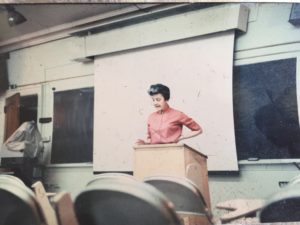
Dr. Evans teaching. Credit: Dr. Audrey Evans
Among her early accomplishments, in 1971, Dr. Evans developed a system for analyzing the progression of cancer to determine the best course of treatment. The Evans Staging System has been credited with reducing the mortality rate for neuroblastoma, a common type of early childhood cancer, by 50%.
Throughout the years, Dr. Evans noticed that families had nowhere to stay while their children were undergoing treatment. Former Philadelphia Eagle tight end Fred Hill remembers her telling him, “The families we see every day, some of them come from long distances and sleep in their car.”
As the parents of a toddler stricken with cancer, Fred and Fran Hill had worked to raise awareness, organize fundraisers, andwith help from Fred’s teammates and their wives, support leukemia and other pediatric cancer organizations. In 1972, the Hills were referred to Dr. Evans as someone who could use their assistance. The answer to their question, “How can we help?” was naturally straightforward. “We need $35,000 to buy a house where parents can stay,” Dr Evans replied.
When the Eagles then general manager, Jim Murray, approached McDonald’s regional manager Ed Rensi about donating 25 cents from the sale of each of the area stores’ new Shamrock Shakes toward the realization of Dr. Evans vision, Rensi replied, “We will give you all that money.” His only requisite? To call it “Ronald McDonald House Charities” to which Audrey replied, “you can call it the hamburger house if you’d like, as long as you cover the bill.”
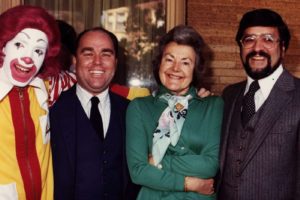
Dr. Evans at the grand opening of the Philadelphia Ronald McDonald House in 1974. Credit: RMHC Philadelphia
In 1974, with invaluable assistance from the Eagles Fly for Leukemia foundation, which the Hill’s friend and neighbor, Stan Lane, had founded, Dr. Evans, Murray, Rensi and the Hills created Ronald McDonald House Charities and opened the nation’s first Ronald McDonald House in Philadelphia.
Nearly a half-century later, Dr. Evans continues to be gratified by the fulfillment of her mentor, Dr. Farber’s, “total care” philosophy. “If I go to a Ronald McDonald House, I see somebody taking care not only of the child who’s staying there, they’re taking care of the whole family. That’s just a beautiful idea.”
Lest anyone fear that Dr. Evans’ life has been consumed by nothing outside of her career, do not be concerned. She has been an avid scuba diver, horseback rider, world-traveler and – believe it or not – sheep shearer.
Of course, Dr. Evans’s lasting legacy will revolve around her work on behalf of children in need and their families. In 2005, Dr. Evans married her longtime friend and colleague, Dr. Giulio D’Angio. Prior to his passing in 2018, the duo worked together for 50 years to advance the field of pediatric oncology through many efforts including the founding of the nation’s first Neuroblastoma Research Group.
After her retirement in 2009, there was still more work to be done. So, in 2011, Dr. Evans co-founded Philadelphia’s St. James School – a year-round, tuition free middle school for under-resourced youth.
When reflecting on her life, Dr. Evans states, “I was given a mission to make a difference in the lives of children.” Asked how she’d like to be remembered she says simply, “as a woman who cared.”
Dr. Evans passed away peacefully in her home, on September 29, 2022, surrounded by the love of a compassionate team dedicated to caring for her, as she did for all her children.
We are all grateful to Dr. Evans for changing the world. We are honored to continue her legacy of caring for families and children.
*Special thanks to “Modern Hero” — a series profiling female role models — for providing source material for this article. Audrey’s “Modern Hero” video garnered 17 million views across platforms, and can be seen on Amazon, YouTube, Facebook, and other platforms. A feature film entitled “Audrey’s Children” is currently being produced about her life and legacy.
